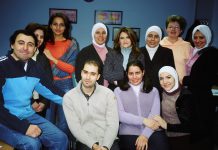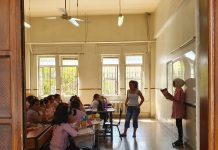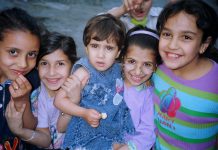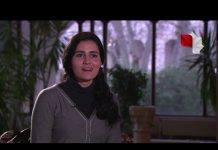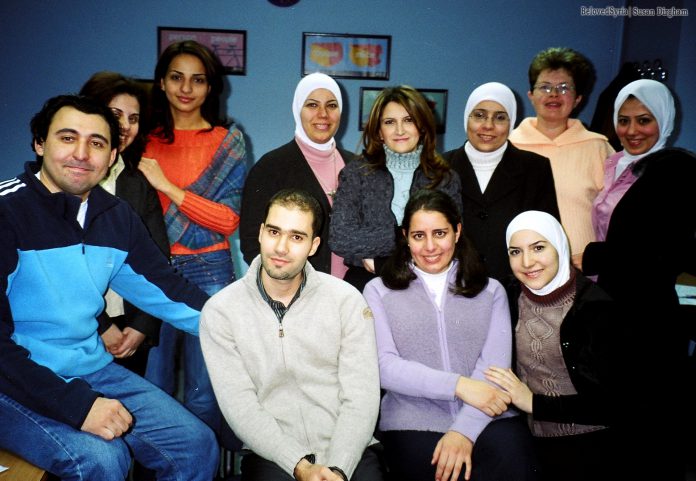Not to be Ignored
Below is a transcript of an interview conducted at the end of 2010, when there was no thought of conflict in Syria, and the issues of the day for educated young women related to their ‘liberation’. The questions chosen were a response to the times since Ms Ayaan Hirsi Ali had recently visited Australia, where she was an outspoken critic of Islam, referring to the confrontation between the ‘moral system’ that she grew up in and the ‘moral system’ she had adopted in the West. My experience of Islam in Syria did not correspond with the negative messages Ms Ali was imparting about mainstream Islam. She was presenting her version of a ‘clash of civilizations’. For me, her worldview was skewed and it could not take us to a better place. However, so many of the women I met in Syria definitely could, given the chance.
– Susan Dirgham,
Interview with Loubna, 32, a former student at the British Council.
Damascus, November 2010
Can you explain in what ways you are a typical Syrian woman?
I don’t think there is a ‘typical’ Syrian woman because being typical somehow tends to stereotype the woman, or each individual, so I don’t think there is a typical Australian, a typical New Zealander, or a typical Syrian. I think that each individual is the product of his environment and of his characteristics, individual characteristics, so there isn’t a typical Syrian man or woman.
Many people in Australia believe that Islam is a violent religion and a religion which oppresses women. Can you comment on that?

As for being a violent religion, I don’t think Islam is violent as a religion itself. It’s a belief that many different people believe in, but I don’t think you can describe it as a violent belief or religion because fanatics or extremists exist in each and every religion: Judaism, Christianity, even in the Sikh religion, so it is not a question that is restricted to one religion. It’s the person who gives some of his individual characteristics to the belief itself. That’s what I think. I don’t think it really oppresses women because after all, with Islam, what is important is your relation with God. There is this thing in Islam, no-one can ask you if you are a believer or not. For example, no one in the street can come up to you and ask, “Are you a believer in God or not?” It is between you and God, and you only and God only will know about that. So, as for oppression towards women, no, I don’t think that is the case. It is just that the social aspects of Islam that say you are a Muslim country are prevalent somehow, but not that prevalent. So if you are speaking about the hijab, I don’t think that is oppression to the woman. It’s a choice, most of the time, taken by a woman after a long thought-process, a lot of soul searching from the woman’s side. Sometimes there is the social aspect to it. [So it is worn] to fit into society, like Australian women dress freely, so if you wear a hijab, you will be easily singled out of the crowd. Sometimes it is a way to fit into your society. Sometimes it is really worn after deep soul-searching, and because you believe you have to wear a hijab.
What are some of the differences between the lives of women in the various communities in the Middle East?
There is a big difference. The media tends to stereotype all the Middle East. But there is not a single community, not a single society in the Middle East. Each country has its characteristics which are reflected in the lives of people, so I don’t think there is one identity for the whole Middle East. Again there is no typical Syrian, and there is no typical Middle Eastern society. So people differ in the Arabic dialect they speak, in the way they dress, in the way they interact, in the way they eat, in the way they communicate with other people. When you are speaking about the differences between the countries in the Middle East, it is like you are speaking about the differences in the English-speaking world. So you have Britain, you have New Zealand, you have Australia, you have the United States, you have Canada. So it is a whole range of countries and social structures. There is a big variety, and you have a whole spectrum of livelihoods, of traditions.
There seems to be a much stronger sense of community in Syria and a much greater focus on family. Do you think that is a fair observation?
I think that is a fair observation because in the Western world generally the main unit in the society is the individual, but here it is the nuclear family: the father, the mother and the kids. So whatever approach you are going to have to a society, you have to build on the nucleus of that society, and here [Damascus] it is the family.
What do you think are some of the conservative attitudes in regard to the relations between the sexes that could change without threatening the unity of the community and the ‘health’ of the family?
Again, you are speaking about a community in general, but each part of Syria has its certain social unique[ness], you can say. For example, people from Damascus, but I’m not speaking … it depends on the family. For example, my family is conservative in its own way. Maybe my friend’s family might be conservative in some other way. For example, speaking about conservatism and relations between sexes, my friends from university used to come over to visit me while my parents were in the house, and they were more than welcome, not only my friends, male and female, but the friends of my older brother, also. This might not sound conservative to other people, but for my family what would be ‘unconservative’ would be for my male friends to come over while my parents are not there, if I am sitting alone. But it doesn’t depend on being conservative. It is something to do with the traditions and the acceptable social behavior in a society. So I don’t classify it under ‘conservative’. I classify it under, for example, when you go in Australia or the Western world, when you go to a house that you enter for the first time, and you are invited for dinner or lunch. You bring some little token of appreciation to the house you are going into. So it is not being conservative or not. It is more about the acceptable, social manners or behavior. This is how I look at it. Again, being conservative varies from one family to the other, as I told you.
In regard to women’s issues and the equality of the sexes, what are some of the differences of opinion in Syria?
You have a whole range of opinions. For example, men are demanding their rights, like to be equal to the women! They are saying, like, women have more rights than men. Or some say, ‘Oh, no, we have lots of things to work on’. So you have the two extremes and in-between. For example, men say women in Syria get maternity leave, but men don’t get [paternity leave]. So that is a big issue here, especially for newly established families, and the man wants to spend some time with his new-born baby, [something] men don’t have the chance to do here in Syria. But some of the people who want more rights for women [acknowledge] there is so much to do, especially when it comes to social liberation, but then I think when it comes to social liberation, it is not going to come like this, in an instant. [Loubna clicks her fingers]. It is not going [to be as simple as a woman saying] okay, I’m going to take off this hijab and I’m going to dress freely. It’s not like this. I think the Western world went through many phases in order to reach this stage. So I don’t think [avoiding] stages of development, if you can call it ‘development’, according to the Western concept of development, it’s no good to [avoid] them. It will not be normal ‘development’. It will be like forcing a society to change 180 degrees. And apart from that, Europe took this long process to get to where it is right now. It did it out of its choice. It was not forced on it, so that is the main thing. If you are going to force me to do something, I will feel reluctant, even if I am open to the idea.
So women in Syria aren’t waiting for the West to save them?
I’m sorry to disappoint the West. No. You know each one of us has his or her battles. Each one of us fights his or her demons. So we will do the fighting. We are strong enough.

What is your philosophy of life?
I never, ever, bothered to think about a philosophy of life. Okay, but I can tell you something about the way I look at life. Life is not easy, but you have to accept it as it is. You have to try to make the best of it on individual, professional, family, and social levels. That is the main thing. Again, you cannot control your life. You hope for things, you work for things, but after all, you can’t really control your life because there are other things that happen outside of your immediate control that [whether] you like it or not will affect your life directly. But it is not about sitting back and complaining about those changes or about those, what do you call it, those factors that affect your life. It’s okay, this is what I have. I have to do the best I can do with what I have right now. So it is just like, concentrate on what you have, and don’t worry.
Islam, from what I understand, means submission. Is that linked to what you have been saying to a certain extent?
I think so in a way, although I didn’t think of it in religious [terms]. But especially in the area I come from, in Syria or the Middle East, there are like certain things that come not from your direct environment but from your indirect environment and they could really affect your life and livelihood. You name it. For example, in the 80s, we were under embargo, and it was a big problem, but what could we do about it? It [affected] all of us. It wasn’t against me as an individual, you know. So, okay, I have to cope with it. I have to work on developing what I have. I have to rely on what I have, the strength that I have, apart from the things that I am missing which are really important, but on the other hand, I have to really focus on what I have.
Do you believe people have a lot of inherent power and resilience?
Yes, I believe this. When I lived in the U.S. for two years, I found that people are so accustomed to certain stuff in their daily lives that we here consider as luxuries. For example, there are no electricity outages, but here, from time to time, we have some. But nonetheless we continue our daily lives. We will be affected, but we will minimize the [extent] of the effect. Yes, so I think people are resilient, and people know how to cope with their daily life in a very competent way.


